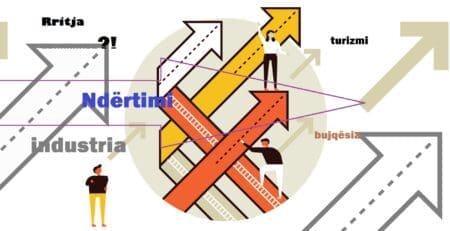Western Balkans: Tax burden in countries which apply progressive taxation and those which apply flat taxation
Fiscal revenues collected by countries applying progressive taxation (Albania and Croatia) compared to the countries applying flat taxation (Kosovo, North Macedonia, Montenegro, Serbia, Bosnia and Herzegovina) are seen to have a higher burden with 2% of GDP.
The tax model for capital and personal income is seen to have an impact on the burden of social and health contributions.
Countries that implement progressive taxation have a burden of contributions on average for the five-year period 2014-2018 higher than those applying flat taxation by 4% more. So, between the two models there is a tax gap of 4%.
If we compare tax rates between Western Balkans countries applying a progressively-scale tax on labor (Croatia, Albania) with flat tax-applying countries (North Macedonia, Montenegro, Kosovo, Serbia, Bosnia and Herzegovina) there is a significant gap between them regarding the burden that has been paid for the budget.
Whereas, when comparing the average progressive tax rates with the flat ones, the gap between them is a 7.7% difference.
This fact between the comparisons for the same model, which on the one side compares fiscal policies through tax rates (the 7.7% gap), and on the other side, the fiscal burden that has been paid to the budget (4% gap) shows that the administration is still working under the allowable capacity of fiscal legislation in the respective countries, which implies high presence of fiscal evasion.
In the total fiscal burden, according to the graphs in the publication of ALTAX, it appears that countries with low productivity in collections of a constituent group of total fiscal burdens (eg social contributions, and other taxes in Kosovo) are offset by higher receipts from another component group (Indirect Taxes in Kosovo).
Meanwhile, over 5 years the indirect tax burden is higher in the countries that apply flat taxation by + 6%.
From various studies conducted for informality in the labor market in Balkan is always the concern of an informal labor market that changes and moves at slower pace than the forecasts and programs of Balkan governments.
If we compare the fiscal burden level for direct taxes of the Western Balkans with the EU-28 average, the difference is more than double.
A narrow direct tax base still indicates an unrelated transition as far as the biggest contribution is to be made to budget direct taxes on capital and labor income (companies and individuals).
The progressive taxation burden, based on its effectiveness, guarantees more revenue in the budget than the burden that guarantees flat taxation.




Leave a Reply
You must be logged in to post a comment.